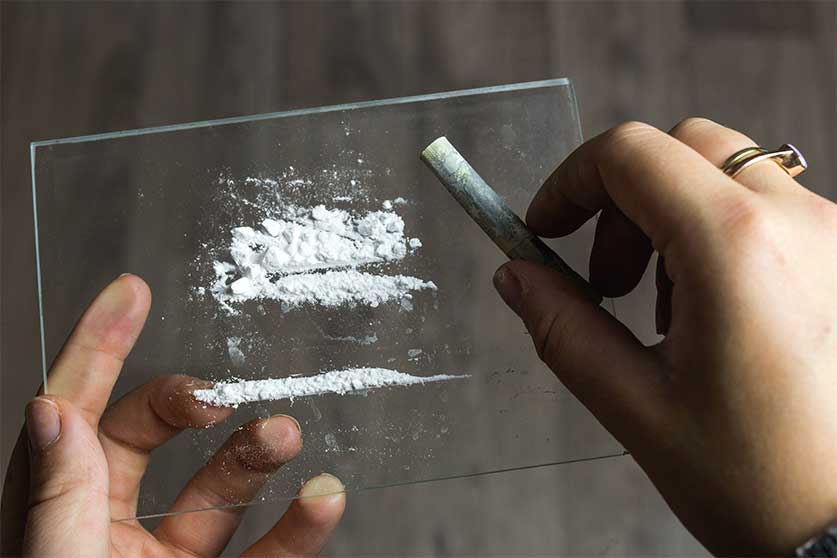Snorting Norco | Effects & Dangers Of Norco Insufflation

Medically Reviewed By: Manish Mishra, MBBS
Those who snort Norco may experience severe sedation, damage to nasal passageways, nosebleeds, and an increased risk of overdose.

Norco (the brand name for the combination of acetaminophen and hydrocodone) is a prescription opioid used as a pain reliever. Norco is a Schedule II controlled substance because it has a high potential for abuse and may lead to snorting hydrocodone.
Norco insufflation is a form of hydrocodone abuse which may create a more intense high compared to those who take the medication orally.
However, those who engage in intranasal hydrocodone-acetaminophen abuse may experience a number of side effects that can range in severity.
Effects Of Snorting Norco
Norco works by binding to opioid receptors in the brain and affecting the central nervous system (CNS). This painkiller is available as an immediate-release or extended-release tablet.
Those who suffer from severe pain and need pain relief may be prescribed Norco. With this prescription medication, a number of common side effects occur, all of which may be heightened due to snorting Norco.
Increased Side Effects
Some of the common Norco side effects that may be increased include:
- sedation
- constipation
- drowsiness
- sleepiness
- lightheadedness
- mental health issues such as anxiety
When prescribed for severe pain, any of the effects mentioned above may occur due to the strength of the medication. Those suffering from a hydrocodone addiction may resort to insufflation.
Severe Effects & Health Problems
If a person crushes a Norco tablet into a powder, they may snort the substance. When Norco is snorted, it enters the bloodstream much more quickly, creating more severe effects.
Those who turn to snorting drugs may develop a number of serious health problems including:
- frequent nosebleeds
- chronic runny nose
- damage to the nasal mucous membranes
- infections of the nasal passages
- hypersensitivity pneumonitis
- irritation of the roof of the mouth
- damage to the respiratory system
- nasal tissue necrosis
In addition to this, damage to the nasal passages may become so severe that a person can develop a deviated nasal septum. Those struggling with this type of drug addiction may be more likely to experience a Norco overdose.
Withdrawal Symptoms
Those suffering from Norco withdrawal may experience a variety of symptoms when they stop use, such as:
- cravings for the drug
- irritability
- diarrhea
- sleeping problems
- vomiting
- tremors
Dangers Of Snorting Norco
There are a number of dangers that may occur when snorting hydrocodone, including an increased risk of opioid addiction and overdose.
Drug Interactions
Those who combine medications, especially illicit drugs, may develop drug interactions. CNS depressants such as benzodiazepines, alcohol, and other opioid medications such as Lortab or Vicodin may result in respiratory depression when combined with Norco.
While Norco may be needed for those suffering from severe pain, it may be abused, resulting in serious side effects such as an overdose.
Opioid Overdose
One of the life-threatening dangers of snorting Norco are the disastrous effects which can occur. For instance, a person’s risk of overdose may increase if they take high doses of Norco when snorting the substance.
According to the United States Food and Drug Administration (FDA), a hydrocodone overdose can result in serious symptoms which may consist of:
- cardiac arrest
- weakness
- clammy or cold skin
- confusion
- low blood pressure
- tiny pupils
- respiratory failure
- seizures
- coma
- sudden death
Upon arrival at the emergency room, doctors may administer Narcan (naloxone), as stated by the National Institute on Drug Abuse (NIDA). Naloxone is a medication used to help reverse the effects of an opioid overdose.
Hydrocodone Addiction Treatment
If you or a loved one are struggling with opioid drug use, healthcare workers at a substance use disorder treatment center In Ohio can help.
Detox
One of the first steps in the treatment process consists of detoxification. When this takes place, you may experience some discomfort.
However, you will be monitored by a medical professional throughout the process. Detox allows your body to rid itself of the unwanted substances in your system.
Inpatient Care
There are a number of treatment options available to you at treatment centers. For instance, you may choose an inpatient program that allows you to have 24/7 access to doctors and medication.
There are also other treatment programs, including medication-assisted treatment, which focus on medication alongside behavioral health therapies.
For information on our opioid addiction treatment options, please contact Ohio Recovery Center today.
- Baylor University Medical Center Proceedings — Hydrocodone snorting leading to hypersensitivity pneumonitis https://www.ncbi.nlm.nih.gov/pmc/articles/PMC4900771/
- Drug Enforcement Administration — Hydrocodone https://www.deadiversion.usdoj.gov/drug_chem_info/hydrocodone.pdf
- Food and Drug Administration — Norco https://www.accessdata.fda.gov/drugsatfda_docs/label/2019/040099s023lbl.pdf
- National Institute on Drug Abuse — What are Prescription Opioids? https://nida.nih.gov/publications/drugfacts/prescription-opioids
- National Library of Medicine: MedlinePlus — Hydrocodone and Acetaminophen Overdose https://medlineplus.gov/ency/article/002670.htm

